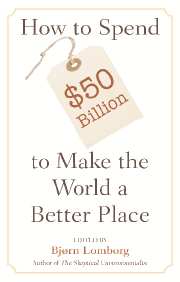Book contents
- Frontmatter
- Contents
- Contributors
- Introduction
- 1 Meeting the Challenge of Global Warming
- CLIMATE CHANGE – OPPONENTS' VIEWS
- 2 Communicable Diseases
- COMMUNICABLE DISEASES – OPPONENTS' VIEWS
- 3 The Challenge of Reducing the Global Incidence of Civil War
- THE CHALLENGE OF CONFLICTS – OPPONENTS' VIEWS
- 4 Toward a New Consensus for Addressing the Global Challenge of the Lack of Education
- THE CHALLENGE OF LACK OF EDUCATION – OPPONENTS' VIEWS
- 5 The Challenge of Poor Governance and Corruption
- THE CHALLENGE OF POOR GOVERNANCE AND CORRUPTION – OPPONENTS' VIEWS
- 6 Hunger and Malnutrition
- HUNGER AND MALNUTRITION – OPPONENTS' VIEWS
- 7 Population and Migration
- POPULATION: MIGRATION – OPPONENTS' VIEWS
- 8 The Water Challenge
- THE WATER CHALLENGE – OPPONENTS' VIEWS
- 9 Subsidies and Trade Barriers
- SUBSIDIES AND TRADE BARRIERS – OPPONENTS' VIEWS
- Expert Panel Ranking
- Index
3 - The Challenge of Reducing the Global Incidence of Civil War
Published online by Cambridge University Press: 27 July 2009
- Frontmatter
- Contents
- Contributors
- Introduction
- 1 Meeting the Challenge of Global Warming
- CLIMATE CHANGE – OPPONENTS' VIEWS
- 2 Communicable Diseases
- COMMUNICABLE DISEASES – OPPONENTS' VIEWS
- 3 The Challenge of Reducing the Global Incidence of Civil War
- THE CHALLENGE OF CONFLICTS – OPPONENTS' VIEWS
- 4 Toward a New Consensus for Addressing the Global Challenge of the Lack of Education
- THE CHALLENGE OF LACK OF EDUCATION – OPPONENTS' VIEWS
- 5 The Challenge of Poor Governance and Corruption
- THE CHALLENGE OF POOR GOVERNANCE AND CORRUPTION – OPPONENTS' VIEWS
- 6 Hunger and Malnutrition
- HUNGER AND MALNUTRITION – OPPONENTS' VIEWS
- 7 Population and Migration
- POPULATION: MIGRATION – OPPONENTS' VIEWS
- 8 The Water Challenge
- THE WATER CHALLENGE – OPPONENTS' VIEWS
- 9 Subsidies and Trade Barriers
- SUBSIDIES AND TRADE BARRIERS – OPPONENTS' VIEWS
- Expert Panel Ranking
- Index
Summary
Introduction and overview
Although wars between nations have become less common in recent decades, the frequency of civil wars around the world has increased. These two types of conflict cannot sensibly be analyzed together, so this chapter focuses entirely on reducing the incidence of civil wars.
Three main approaches are discussed:
Conflict prevention.
Shortening conflicts.
Post-conflict policies.
Since the post-conflict period actually presents particularly high risks, the biggest opportunity lies in preventing wars from recurring.
The benefits of reducing the incidence of civil war
Benefits from reducing conflict and war accrue at three distinct levels: national, regional and global.
Taking the national level first, one clear cost of civil war is a reduction in economic growth. Using a conservative estimate, one year of conflict reduces a country's growth rate by 2.2%. Since, on average, each civil conflict lasts for seven years, the economy will be 15% smaller at the end of the war than if the war had not taken place. During the post-war recovery, even though the economy on average grows at an annual rate of more than 1% above the norm, it will take roughly 10 years to return to its pre-war growth rates (that is, 17 years after the conflict started). 21 years after the start of the original war, the GDP has returned to the level it would have achieved if no war had occurred.
- Type
- Chapter
- Information
- Publisher: Cambridge University PressPrint publication year: 2006
- 3
- Cited by



